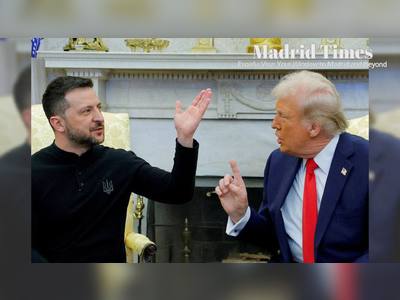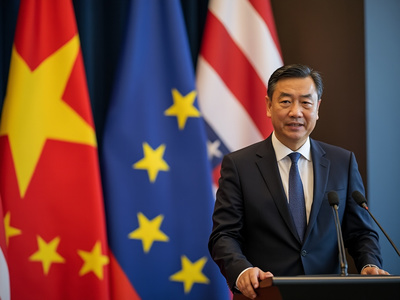
Wall Street on Alert Over Trump's Treatment of the EU Amid Economic Concerns
Key figures from Wall Street highlight potential repercussions of U.S.-EU tensions as investment figures reveal significant transatlantic economic ties.
Concerns are mounting on Wall Street regarding President Donald Trump's treatment of the European Union, with implications that could reverberate through both the U.S. and European economies.
The U.S. Department of Commerce reports that American investments in Europe surpass $4 trillion, representing 60% of all U.S. foreign investments.
James Dimon, the CEO of JPMorgan Chase, the largest bank in the U.S. and globally, and Elon Musk, the CEO of Tesla, are vocal advocates for maintaining strong ties with Europe.
In his recent letter to shareholders accompanying JPMorgan's annual report, Dimon emphasized the importance of a robust Europe, stating, "Our goal should be to help Europe become stronger and keep it close.
If Europe fragments, the world will look much like the prelude to World War II. It will be disastrous."
Dimon elaborated on the potential consequences of a fragmented Europe, noting that individual nations may seek closer relations with countries such as Russia and Iran for energy or with China for trade, which he suggests could lead them to become "vassal states" dependent on these relationships.
He criticized Trump's "America First" policy, cautioning that it should not lead to the U.S. becoming isolated.
Highlighting concerns regarding Europe's economic decline, Dimon encouraged the EU to take steps to improve its competitiveness and become a significant engine of growth in the West.
He warned of the potential acceleration of Europe's decline due to U.S. punitive measures and stated that countries within the EU need to undertake significant economic reforms to foster growth.
He pointed to labor laws in parts of Europe that could hinder job creation, indirectly referencing Spain and Greece—the two countries with the highest unemployment rates in Europe—while mentioning Greece as an example of effective reform.
According to Dimon, the prescription for the EU should include substantial economic reforms, achieving a single market for easier intra-European trade, and initiating labor and tax reforms to spur business growth and employment.
He also called for increased military spending, with the expectation that the U.S. would support these initiatives.
Elon Musk, whose companies Tesla and SpaceX are keen to expand in Europe, has also expressed concerns and advocated for a zero-tariff arrangement between the U.S. and Europe, proposing the establishment of a free trade zone.
Musk noted, "This has been my advice to the President," during a recent visit to Italy.
On the European side, Gilles Moec, chief economist at AXA, indicated that the trade war could significantly impact Europe.
He highlighted the decrease in U.S. demand as a direct consequence of tariffs pushing up prices on European products, alongside a recession-induced decline in exports.
Moec acknowledged that while the damage might be greater for the U.S., Europe's starting economic position is already weaker.
Dimon also remarked on the potential harm of Trump's policies to the U.S. economy, predicting slower growth and an upward trend in prices.
Although many executives on Wall Street have refrained from directly criticizing Trump, they have pointed to the difficulties arising from his policies.
Larry Fink, the CEO of BlackRock, warned of inflationary pressures and noted that many of the CEOs he consults anticipate the U.S. economy may already be entering a recession, with Goldman Sachs estimating a 45% likelihood of recession as it cuts positions in European equities.
The U.S. Department of Commerce reports that American investments in Europe surpass $4 trillion, representing 60% of all U.S. foreign investments.
James Dimon, the CEO of JPMorgan Chase, the largest bank in the U.S. and globally, and Elon Musk, the CEO of Tesla, are vocal advocates for maintaining strong ties with Europe.
In his recent letter to shareholders accompanying JPMorgan's annual report, Dimon emphasized the importance of a robust Europe, stating, "Our goal should be to help Europe become stronger and keep it close.
If Europe fragments, the world will look much like the prelude to World War II. It will be disastrous."
Dimon elaborated on the potential consequences of a fragmented Europe, noting that individual nations may seek closer relations with countries such as Russia and Iran for energy or with China for trade, which he suggests could lead them to become "vassal states" dependent on these relationships.
He criticized Trump's "America First" policy, cautioning that it should not lead to the U.S. becoming isolated.
Highlighting concerns regarding Europe's economic decline, Dimon encouraged the EU to take steps to improve its competitiveness and become a significant engine of growth in the West.
He warned of the potential acceleration of Europe's decline due to U.S. punitive measures and stated that countries within the EU need to undertake significant economic reforms to foster growth.
He pointed to labor laws in parts of Europe that could hinder job creation, indirectly referencing Spain and Greece—the two countries with the highest unemployment rates in Europe—while mentioning Greece as an example of effective reform.
According to Dimon, the prescription for the EU should include substantial economic reforms, achieving a single market for easier intra-European trade, and initiating labor and tax reforms to spur business growth and employment.
He also called for increased military spending, with the expectation that the U.S. would support these initiatives.
Elon Musk, whose companies Tesla and SpaceX are keen to expand in Europe, has also expressed concerns and advocated for a zero-tariff arrangement between the U.S. and Europe, proposing the establishment of a free trade zone.
Musk noted, "This has been my advice to the President," during a recent visit to Italy.
On the European side, Gilles Moec, chief economist at AXA, indicated that the trade war could significantly impact Europe.
He highlighted the decrease in U.S. demand as a direct consequence of tariffs pushing up prices on European products, alongside a recession-induced decline in exports.
Moec acknowledged that while the damage might be greater for the U.S., Europe's starting economic position is already weaker.
Dimon also remarked on the potential harm of Trump's policies to the U.S. economy, predicting slower growth and an upward trend in prices.
Although many executives on Wall Street have refrained from directly criticizing Trump, they have pointed to the difficulties arising from his policies.
Larry Fink, the CEO of BlackRock, warned of inflationary pressures and noted that many of the CEOs he consults anticipate the U.S. economy may already be entering a recession, with Goldman Sachs estimating a 45% likelihood of recession as it cuts positions in European equities.
Translation:
•
Translated by AI
AI Disclaimer: An advanced artificial intelligence (AI) system generated the content of this page on its own. This innovative technology conducts extensive research from a variety of reliable sources, performs rigorous fact-checking and verification, cleans up and balances biased or manipulated content, and presents a minimal factual summary that is just enough yet essential for you to function as an informed and educated citizen. Please keep in mind, however, that this system is an evolving technology, and as a result, the article may contain accidental inaccuracies or errors. We urge you to help us improve our site by reporting any inaccuracies you find using the "Contact Us" link at the bottom of this page. Your helpful feedback helps us improve our system and deliver more precise content. When you find an article of interest here, please look for the full and extensive coverage of this topic in traditional news sources, as they are written by professional journalists that we try to support, not replace. We appreciate your understanding and assistance.











